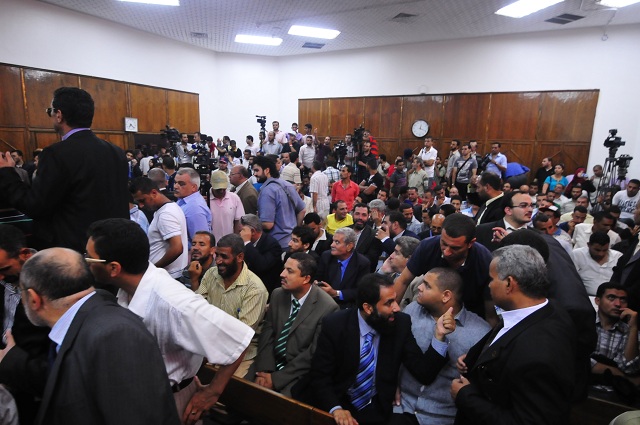
(AFP FILE PHOTO / MOHAMED EL-SHAHED)
A year of Abdel Fattah Al-Sisi’s presidency has shown “negative” progression towards an environment of democracy and human rights in a newly surfaced US State Department report.
The report, however, adds that regional security and economic interests call for ongoing US support for the Egyptian administration.
“While Egypt has implemented parts of its ‘democracy roadmap’, the overall trajectory of rights and democracy has been negative. A series of executive initiatives, new laws, and judicial actions severely restrict freedom of expression and the press, freedom of association, freedom of peaceful assembly, and due process, and they undermine prospects for democratic governance,” the document summarises.
The report, dated 12 May, from the office of Secretary of State John Kerry to Congress documents Egypt’s deteriorating direction across numerous political fields, which is derailing progress towards democracy. First published by the New York Times on Sunday, Daily News Egypt was passed a copy of the document which, despite all the listed violations, calls assistance to Egypt “important to the national security interest of the United States”. It also appears to be the waiver that allows the White House to resume in full the $1.3bn of military and economic aid, regardless of Egypt’s political situation.
Since his inauguration on 8 June 2014, President Al-Sisi has ruled by decree without the presence of a parliament, the third stage of the “democracy roadmap” proposed after the ouster of former president Mohamed Morsi in July 2013. Whilst the US report acknowledges that Al-Sisi has called a quick re-drafting of the elections law to hold the vote, it adds that “continued restrictions on the exercise freedoms of expression and association and press freedoms negatively influence the elections environment”.
Quoting the government’s own figures, the report notes that between the July 2013 regime change and March 2015, 16,000 people have been arrested. Local rights organisations, however, believe the number is closer to 40,000. The US document recognises that many arrests have been political as part of a crackdown on the Muslim Brotherhood, many of whom have later faced mass trials and death sentences. Numerous secular activists have also been incarcerated under legislation that includes the controversial Protest Law, which has seen the arrest of thousands of demonstrators. As a result, revolutionary groups including the now-outlawed 6 April movement, and citizens of all stripes have been tried in vastly expanded military courts.
One element of curtailed freedoms documented in the report includes the quashed role of civil society in Egypt: “Human rights NGOs and civil society activists describe a steadily shrinking space for peaceful dissent, leading some of them to self-censor many of their political activities that could be deemed controversial, or even leave the country,” it reads.
In December, the Cairo Institute for Human Rights Studies (CIHRS) announced that, after 20 years of operation, they will be moving much of their work to Tunisia. The NGO said the decision was taken “in light of the ongoing threats to human rights organisations and the declaration of war on civil society” in Egypt. In addition to ongoing harassment from authorities, in October Al-Sisi signed a decree that allows for death sentences for individuals found guilty of receiving foreign funds for activities that could “endanger the state”, frightening many in civil society for its vague wording.
Al-Sisi has, to some extent, acknowledged that the government committed mass human rights abuses after the overthrow of his Muslim Brotherhood predecessor Mohamed Morsi. In January, however, he said the abuses were understandable given the “exceptional” security challenges faced by the country.
“Nobody is against human rights…But today Egypt is in an exceptional condition,” Al-Sisi said in an address to police officers and ministers before this year’s annual police day in January. “I am more concerned for human rights than anyone else,” he said, after awarding families of police officers killed in security operations. Al-Sisi has repeatedly said that stability in Egypt is the top priority, trumping the pursuit towards democratic freedoms.
However, in a report issued on Monday’s one anniversary, prominent international NGO Human Rights Watch suggested that the ‘year of abuses’ may become part of the administration’s ultimate undoing.
“The Al-Sisi government is acting as though, to restore stability, Egypt needs a dose of repression the likes of which it hasn’t seen for decades, but its treatment is killing the patient,” said Joe Stork, deputy Middle East and North Africa director at Human Rights Watch. “What makes it worse is that Western governments that subordinated human rights in their relations with Egypt during the Mubarak era seem ready to repeat their mistake.”


